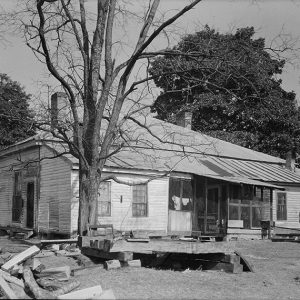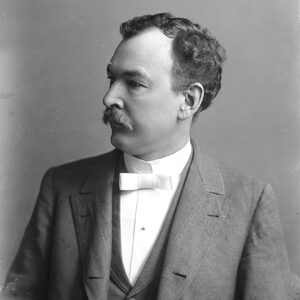calsfoundation@cals.org
William Leake Terry (1850–1917)
William Leake Terry was a Democratic member of the U.S. House of Representatives. He represented the Fourth District of Arkansas from 1891 to 1901, beginning in the Fifty-Second Congress and extending through the Fifty-Sixth Congress.
William L. Terry was born on September 27, 1850, near Wadesboro, North Carolina, to William Leake Terry and Mary Parsons Terry. Terry and his family moved to Tippah County, Mississippi, in 1857. After his mother’s death in 1861, he and his father moved to Pulaski County, Arkansas. Terry was orphaned by 1865 and became the ward of his uncle, Colonel Francis A. Terry, who provided for his education, first at Bingham’s Military Academy in North Carolina and then at Trinity College in North Carolina. He graduated from Trinity in 1872 and was recognized as having achieved the highest honors in the school’s history. He went on to pursue the study of law and was admitted to the Arkansas bar in November 1873.
Terry quickly gained a reputation as a skilled, effective, and dashing courtroom attorney. After developing a flourishing legal practice, Terry entered the local political arena, initially serving as a member of the Little Rock City Council from 1877 to 1879. Serving in the Arkansas Senate from 1878 to 1879, he became Senate president during only his second year. Terry also served as city attorney for Little Rock (Pulaski County) from 1879 until 1885 and was featured as the outstanding attorney in the city’s 1886 promotional brochure.
He was unsuccessful in his 1886 bid for a seat in the House of Representatives, his first candidacy for national office. Terry ran again in 1890, winning this time. He began the first of five terms, representing Arkansas’s Fourth District from March 1891 until March 1901. During his time in Congress, Terry’s legal expertise was put to good use when he joined the Judiciary Committee; by the end of his tenure, he had become the ranking Democrat on the panel. In that position, Terry played an influential role in the court reform efforts that the committee undertook, while also serving as political thorn in the side of the Republican House speaker, Thomas B. “Czar” Reed. Terry also played an important role in the development of laws for the newly organized Indian Territory in the west.
In 1900, Terry was denied the party’s re-nomination in favor of Charles C. Reid. He left Congress to return to Little Rock, where he resumed his legal practice.
Terry was married twice, first to Mollie C. Dixon, with whom he had three sons (including David Dickson Terry, who became a U.S. congressman), and later to Florence Forshe, with whom he had one child. Forshe died at the age of thirty-four, leaving Terry with the couple’s eleven-year-old daughter.
Terry died on November 4, 1917, at the age of sixty-seven in Little Rock. A Roman Catholic, he is interred in the city’s Calvary Cemetery. The William L. Terry House in Little Rock was added to the National Register of Historic Places in 1976.
For additional information:
“Wife of Former Representative Terry of Arkansas Dies in Denver.” Denver Post, February 23, 1912, p. 10.
“William L. Terry House.” National Register of Historic Places nomination form. On file at Arkansas Historic Preservation Program Little Rock, Arkansas. On file at http://www.arkansaspreservation.com/National-Register-Listings/PDF/PU2937.nr.pdf (accessed October 5, 2021).
“William Leake Terry.” Biographical Directory of the United States Congress. http://bioguide.congress.gov/scripts/biodisplay.pl?index=T000137 (accessed October 5, 2021).
William H. Pruden III
Ravenscroft School
 Post-Reconstruction through the Gilded Age, 1875 through 1900
Post-Reconstruction through the Gilded Age, 1875 through 1900 Royston House
Royston House  William L. Terry
William L. Terry 




Comments
No comments on this entry yet.